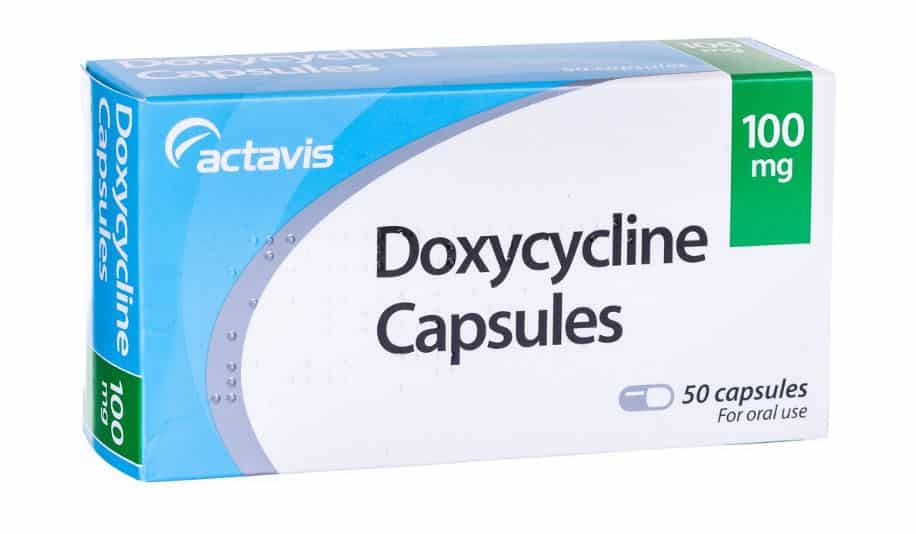Listen to the Podcast:
Medicines are intended to alleviate symptoms, not exacerbate them. Unfortunately, there are a few medications that literally make matters worse. Doxycycline is one of these drugs that might doxycycline ruined my life rather than treat my illness.
You may be suffering from acne or another bacterial illness, and doxycycline has been prescribed for you. Yet, you are unsure whether to take this prescription because you have read poor reviews and many have described the drug as terrible for them. We will clarify your confusion and answer your questions in the following section.
The essay discusses how this Doxycycline ruined my life, as well as how to combat its negative effects and recover optimally.
What is Doxycycline?
Doxycycline is an antibiotic used to treat a variety of bacterial illnesses, including urinary tract infections, lung infections, etc. Doxycycline is also a tetracycline-class antibiotic. It inhibits bacterial development and relieves illnesses. Moreover, it has an anti-inflammatory impact that is utilized to treat a variety of illnesses.
Doxycycline treats acne, urinary tract infections, respiratory tract infections, gonorrhea, chlamydia, eye infections, syphilis, and other bacterial infections. Doxycycline prevents malaria and other infections. It also treats leprosy. Moreover, it heals illnesses resulting from mites, ticks, and lice.
How Doxycycline Ruined My Life?
Certain medications cause an adverse drug response or ADR. So, it is a broad term that refers to your medication’s harmful, undesirable, and unpleasant side effects. ADR is classified as a form of toxicity. Typical adverse medication reactions include jaundice, rashes, anemia, kidney damage, decreased hearing and vision, nerve harm, and a dramatic drop in the number of white blood cells. These reactions get increasingly severe, but very few people experience them. If you suddenly experience unpleasant side effects after taking doxycycline, you are not alone.
The largest number of individuals are suffering adverse effects from this medication. However, after using this treatment, some patients experience severe side effects such as mental health concerns and organ damage. The condition that causes organ destruction is commonly recognized as sepsis. This is a serious condition that can be fatal. It occurs when the immune reaction to a drug becomes so powerful that it causes damage to healthy organs and tissues.
Side Effects of Doxycycline
Often, the adverse effects of doxycycline are minimal. Yet, in extremely rare circumstances, complications resulting from undesirable consequences may be fatal.
Rarely do serious responses when doxycycline occurs. However, the majority of Doxycycline users may have certain common side effects. People frequently inquire about the duration of doxycycline side effects. Similarly to its efficacy, it depends on the health conditions.
More Common Side Effects
The most frequent adverse effects of doxycycline include:
- loss of appetite
- nausea and vomiting
- diarrhea
- rash
- sensitivity to the sun
- hives
- temporary discoloring of adult teeth (goes away with dentist cleaning after the drug is stopped)
If these side effects are modest, they may disappear in a few days or weeks. So, see your doctor or pharmacist if they become more severe or do not go away.
Serious Side Effects
Contact your doctor immediately if you experience severe adverse effects. If your symptoms feel life-threatening or if you believe you are experiencing a medical emergency, dial 911 immediately. The following are examples of severe adverse effects and accompanying symptoms:
1. Antibiotic-associated diarrhea. Symptoms can include:
- severe diarrhea
- bloody diarrhea
- stomach cramping and pain
- fever
- dehydration
- loss of appetite
- weight loss
2. High blood pressure inside your skull. Symptoms can include:
- headache
- blurry vision
- double vision
- vision loss
3. Irritation of your esophagus or ulcers in your esophagus (may be more likely if you take your dose at bedtime). Symptoms can include:
4. Anemia
5. Pancreatitis. Symptoms can include:
- pain in your upper abdomen, or pain in your abdomen that moves to your back or gets worse after you eat
- fever
6. Serious skin reactions. Symptoms can include:
- blisters
- peeling skin
- a rash of small purple spots
What are The Long-Term Side Effects of Doxycycline?
As with all antibiotics, doxycycline is not typically administered for extended periods. The most severe side effect of long-term treatment is the development of antibiotic-resistant bacteria or C. difficile overgrowth in the colon. Both are potentially fatal dangers, thus long-term treatment is typically avoided. Nonetheless, some individuals do use doxycycline long-term, notably for acne or rosacea. In such instances, healthcare providers are urged to conduct routine lab testing to ensure the organs, notably the kidneys, liver, and blood, are healthy.
Precautions while Taking Doxycycline
Doxycycline is also a highly effective antibiotic. Hence, it must be taken cautiously and with certain precautions.
Children under 8 years old and pregnant women have not been prescribed Doxycycline. In young children, tetracyclines can cause enamel deterioration and tooth discoloration. During pregnancy, it can cross the placental membrane and injure the baby’s bones, as well as cause irreversible tooth discoloration later in life.
In addition, Doxycycline is not prescribed to tetracycline-allergic patients. You cannot take Doxycycline if any of the following conditions apply:
- Have an allergic reaction to doxycycline or any other tetracycline medication
- Suffering from Liver disease
- Suffering from Kidney disease
- Have asthma or sulfite allergy
- Suffering from Oesophageal inflammation (oesophagitis)
- Have an increased intracranial pressure
- Suffering from any autoimmune condition
Before Using
The hazards of taking a medicine must be evaluated against the medicine’s benefits prior to its usage. This will be determined by you and your physician. For this medication, the following considerations should be made:
Allergies
Inform your doctor if you have ever experienced an unusual or adverse reaction to this or other medications. Furthermore inform your doctor if you have any additional allergies, such as those to foods, colors, preservatives, or animals. With non-prescription products, carefully check the label or packaging for a list of ingredients.
Pediatric
Doxycycline may cause persistent tooth discoloration and bone growth retardation. Except for the treatment of exposure to inhalational anthrax or rickettsia infection, this medication should not be administered to children younger than 8 years of age, unless directed by a physician.
Geriatric
Studies conducted yet have not revealed any geriatric-specific issues that might limit the efficacy of doxycycline in senior patients. However, senior people are more prone to kidney, liver, or cardiac issues, which may necessitate caution and a dose change for those using doxycycline.
Breastfeeding
There are no good studies on women to determine the harm to the newborn when this medicine is used by a breastfeeding mother. When taking this drug during breastfeeding, weigh the possible advantages against the potential hazards.
Doxycycline Dose
Most frequently, Doxycycline is supplied in pill form. Nevertheless, it is also offered in tablet, suspension, and injectable forms.
The adult doses for doxycycline capsule form are as follows:
- Monodox – 50 mg, 75 mg, 100 mg
- Vibramycin – 100 mg
- Adoxa – 150 mg
Available doses in tablet form:
- Generic, Adoxa – 20 mg, 50 mg, 75 mg, 100 mg
- Acticlate – 75 mg, 150 mg
Doses in Syrup and Oral suspension form:
- Vibramycin (syrup) – 50 mg/5 mL
- Vibramycin (oral suspension) – 25 mg/5 mL
Drug Interactions
Drug interactions may alter the effectiveness of your prescriptions or raise your chance of experiencing severe side effects. This document does not contain all possible medication interactions. Provide a list of all the products you use with your physician and pharmacist. Do not initiate, discontinue, or alter the dosage of any medications without your doctor’s consent.
Oral retinoid medicines, barbiturates, “blood thinners”, digoxin, anticonvulsant drugs, and strontium may interact with this medication.
This medicine may interact with some laboratory tests, resulting in potentially inaccurate results. Make sure laboratory personnel and all of your physicians are aware you use this medication.
What will Happen If You Overdose on Doxycycline?
There will be side effects such as increased nausea and diarrhea. Typically, the therapy of a doxycycline overdose is dictated by the amount of medication used and the bad effects or unusual symptoms detected.
The most common treatment for doxycycline overdose is supportive care, which involves treating the symptoms of the overdose. Contact your physician promptly if you’ve taken an excessive amount of this drug.
What will Happen When You Misuse Doxycycline?
While pharmaceuticals like doxycycline are only to be used precisely according to a doctor’s prescriptions, if you abuse antibiotics or other medications, you accept the risks or side effects of this abuse.
Some of the negative effects you may experience could be severe and life-threatening, as described in the section above, and there are specific conditions in which you should never take this drug, as well as certain substances that you should never take this drug with.
Thus, never overuse this medicine, and always check with your physician before using similar medications.
What to Avoid While Taking Doxycycline?
Iron supplements, multivitamins, calcium supplements, antacids, and laxatives should not be taken within two hours of taking doxycycline.
Avoid taking additional antibiotics with doxycycline unless instructed to do so by your physician.
Avoid direct sun exposure and tanning beds. Doxycycline can make you more susceptible to sunburn. Outside, wear protective gear and apply sunscreen (SPF 30 or higher).
Diarrhea caused by antibiotics may be an indication of a new infection. Call your doctor if you experience diarrhea that is watery or bloody. Use anti-diarrhea medication only if prescribed by your doctor.
How to Treat Side Effects of Doxycycline Hyclate
Not all adverse effects are avoidable. A few adverse effects will necessitate medical attention, but the majority can be treated at home.
Headaches
Consuming liquids and getting some sleep can help relieve a headache. Before taking over-the-counter pain medicines, seek medical advice from a doctor. If headaches are severe, contact your doctor immediately.
Increased pressure in the brain
Vision changes, strong headaches, and vertigo are symptoms of a potentially serious doxycycline side effect. Urgent medical attention is necessary. Particularly concerning symptoms include blurred vision, double vision, and pain behind the eyes.
Nausea
Doxycycline isn’t taken with food, so drinking water is helpful for nausea and vomiting. If vomiting is severe or persistent, consult your doctor.
Sunlight reactions
Stop taking Doxycycline if sunlight creates an abnormal skin reaction. Manifestations include rashes, redness, itching, and sunburn. Contact the prescriber or other healthcare professional immediately.
Diarrhea
Consume fluids to avoid dehydration. Get emergency medical care if diarrhea is severe, watery, bloody, or accompanied by stomach pain. Severe diarrhea can occur weeks or months after doxycycline treatment has ended and is indicative of a severe secondary infection.
Drug or Allergic Reactions
Stop taking doxycycline and contact a physician if you experience an allergy or adverse medication reaction. Rapidly developing skin responses might become life-threatening medical problems. Extreme skin or allergic response symptoms.
What Happens If You Miss a Dose of Doxycycline?
It’s easy to forget to take a dose of medication occasionally, especially if you’re not used to taking a short-term prescription like doxycycline.
If you forget to take your doxycycline medication, take it as soon as you recall. However, if it is nearly time for your next regular dose, you should forgo the missed dose. Do not double the dose to compensate for a missing one. Taking two or more doses of doxycycline at once raises the chance of adverse effects such as stomach discomfort and skin sensitivity.
Conclusion
If Doxycycline is not taken correctly, besides it might doxycycline ruined my life. Hence, this medication should not be taken without first visiting a physician. This medication has numerous negative effects, some of which are severe.
However, pregnant women and children under 8 should not use doxycycline. This medicine carries several risk indicators. If any warning symptoms manifest, emergency medical services should be summoned.
Nonetheless, while prescribing Doxycycline, a physician considers all of its side effects and complications in order to achieve the greatest results.
Frequently Asked Questions (FAQs) about Doxycycline Ruined My Life
Are Doxycycline antibiotics strong?
Doxycycline treats respiratory, urinary, ocular, and other bacterial diseases.
Can Doxycycline make you feel weird?
Doxycycline has also numerous adverse effects that affect multiple body systems. That might make you feel strange and ill. Occasionally, it could be considerably worse.
Can doxycycline cause permanent damage?
Doxycycline and other tetracyclines can cause persistent discoloration by forming tetracycline-calcium orthophosphate complexes at sites of calcification, such as developing teeth and bone. For that Doxycycline ruined your life.
Can doxycycline cause health problems?
Severe adverse effects are uncommon, affecting fewer than 1 in 1,000 patients. Signs of blood abnormalities include unusual bleeding or bruising, a sore throat, a high temperature, and an overall sense of illness or exhaustion.
Why should I stop taking doxycycline?
Basically, doxycycline may cause serious side effects. For this reason, Doxycycline ruined your life. So, DISCONTINUE doxycycline and seek immediate medical attention if you experience: a tightening of the neck or difficulty breathing. Inflammation of the lips, tongue, or face.
How many months should I take doxycycline?
Adults and children weighing at least 45 kilograms (kg) should take 100 mg twice daily (every 12 hours) for 60 days. For children weighing less than 45 kg Dosage must be determined by a physician depending on body weight. Generally, the dosage is 2,2 mg per kg of body weight per day, twice daily for 60 days.







































